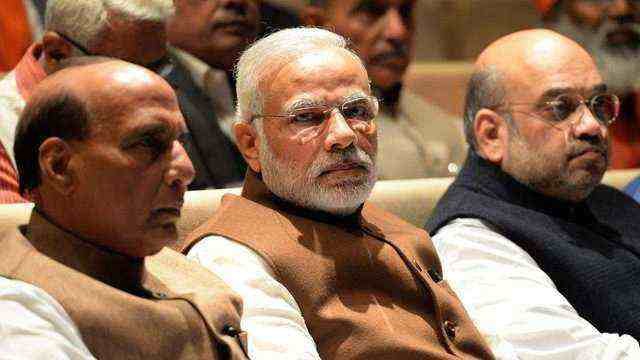
When a billion plus populace give a war cry in unison, it is often difficult for the incumbent government of any country to ignore it without running the risk of massive facing public ire. There is no doubt that people of India, sick and tired of witnessing coffins of young men in uniform returning from Kashmir for decades now, expect the Narendra Modi government demonstrate some decisive action against the menace of terrorism emanating from Pakistan.
Yet, the irony is that India is not the only country seeking vengeance now.
A day before the Pulwama terror attack on CRPF convoy, Iran was hit with a similar terror attack by Pakistan-linked Sunni extremist groups using the same template of ramming a vehicle laden with explosives into a bus carrying security personnel, leading to huge casualties. Iran is now resonating with cries of vengeance on Pakistan for harbouring such terror groups. A few weeks ago, Afghanistan lost more than 100 security personnel in a similar attack on one of its training centres. There, too, was a Pakistan hand.
This century is Asia’s century, both from the perspective of economic growth as well as security vulnerability emanating from hotbeds of terror such as Pakistan. Thus, the solution to it has to be from Asia and by Asian countries.
In the first place, India needs to stop expecting US or others to do the needful. Countries like India don’t go to fight America’s or Russia’s wars elsewhere. Thus, beyond solidarity, India should not expect much from them and instead develop its own allies in this war based on regional interest.
While a short intense conflict based on the Cold Start Doctrine, but short of a full-fledged war, or at least an air-strike, cannot be ruled out in the short run, the larger strategy has to be multi-pronged and multi-dimensional. This is where Iran and Afghanistan can play critical role.
In spite of neutralising more than 700 terrorists in the last few years, where India faltered is in the realm of raising the cost on Pakistan for inflicting terror attacks on India. Pakistan, sadly, never had to pay a heavy price for doing the same repeatedly. The Pulwama terror attack and the kind of passionate reaction it has evoked across India may well be a turning point though.
Beyond just targeting the mobile terror camps, India’s massive naval presence across the western front needs to mobilised for threatening Pakistan with real time naval blockade if the need be. Aggressive patrolling for cutting off Pakistan’s sea routes can be a real-time effective measure given the vulnerability of Pakistan in naval countermeasures. In spite of Chinese investments in Gwadar, it would not be easy for China to run in its Navy that far. Naval blockade or the threat of it, had its impact both during 1971 Indo-Pak War as well as Kargil War.
Indus Water remains a contentious issue and for all the goodwill India has shown by abiding with the international laws on sharing of water, Pakistan has often reciprocated with terrorism. Time has come for India to tighten the screw in this area too. Some may contend that China may do the same on India but fact remains that India respects China’s territorial integrity and does not resort to destructive terror attack inside China. Thus, there is a difference. Drying taps and fields would make Pakistan rethink on many things.
From the geopolitical perspective, it is in India’s interest to see a stronger Iran in addition to a developed Afghanistan. India has to make its own coalition with Iran and Afghanistan, even at the cost of ire of some western powers and instil real-time fear in the heart of Pakistan of being surrounded geographically by India and Iran on two sides and of a two-frontal war that it may have to face sometime in future if it does not mend its ways. Only the fear of sea blockade and drying taps resulting in empty plates and in addition to quick and intense retribution can make any difference.
Over the last two years, some major economic actions have been initiated on Pakistan by the global community led by US, including putting Pakistan in the grey list of Financial Action Task Force (FATF) and drying up of aid and Coalition Support Fund. However, even though Pakistan is on the verge of economic bankruptcy and is surviving on borrowed money, its impact on terror groups deeply entrenched within the Pakistani establishment, has been limited. Fact remains that a rogue state imbued with fanatic ideologies does not care much for economic collapse or prosperity. In any case, they have enough slush money through drug trade and fake currencies to carry on with their activities.
Finally, it is time to do some tough talk with China too. India has to say it clearly that China is either with India or against it. It can’t keep on making billions from Indian market and spend on fortifying Pakistan and remain blind eye to its activities.
To end the menace, it is India that has to fight the prolonged battle and not just the armed forces. Crying for war is fine, but there is a price associated with it. It took no less than six years for the combined might of allied powers to defeat Germany. Israelis pay a price every day for their existence. If India wants to take the battle into the heart of Pakistan, there is a cost associated with it.
People of India would have to decide whether they are ready for the prolonged and intense struggle or whether their outrage is limited to as long as visuals of Pulwama remain in the prime-time of news channels.


.jpeg)

